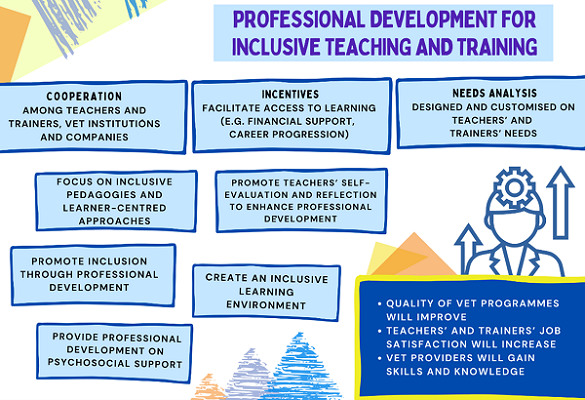Towards more inclusive vocational education and training (VET)

Rebuilding motivation for learning
Motivation for learning is the key to reintegrating early leavers. Many have experienced underachievement in the past, undermining their trust in their own abilities or in education.
To rebuild this trust, teachers need a set of teaching and transversal skills.
- Communication and active listening: approaching early school leavers with empathy and understanding; being listened to will help them rediscover forgotten abilities and potential.
- Learner-based teaching: encouraging learner teamwork; using creative and alternative teaching methods that engage learners in art, sport and/or nature activities; learner participation in the choice of teaching methods increases their engagement.
- Psychosocial support: insufficient attention to psychosocial problems can cause early school leaving; teachers need to know modern methods and approaches to offer effective psychosocial support throughout the educational process.
- Managing diversity: school- and work-based learning environments often comprise heterogeneous groups of learners due to migration and international mobility; students who are displaced or have different abilities, cultural backgrounds and learning difficulties need particular attention.
- Digitaland green skills: updating these is crucial so teachers can help their students keep pace and adapt to the ongoing transitions in our societies.
Find more intervention approaches in Cedefop’s VET toolkit for tackling early leaving.
© Cedefop
Supporting NEETs to join VET programmes
NEETs are young people who live outside formal employment and education or training. They are highly heterogeneous but have one main aspiration: social and professional reintegration into communal life. This is a central goal of VET programmes oriented toward them.
Their teachers must be trained to understand the specific needs and characteristics of each NEET profile. One-to-one support and differentiated teaching help NEETs reach learning outcomes, regardless of their starting points.
NEETs often express dissatisfaction with formal education; they should be encouraged to openly express their views and be offered alternatives to motivate their re-engagement. Teachers need skills for hands-on teaching and engaging learners in teamwork, experiential learning and other learner-centred activities.
Easing transitions into work is important; teachers are often the first people NEETs ask for help in their search for a job or training. A holistic approach strengthens links between VET programmes and the labour market, ensuring cooperation between VET educators, career counsellors and specialists in the labour market.
Visit Cedefop’s VET toolkit for empowering NEETs to learn more about different NEET profiles and intervention approaches.
Join Cedefop’s community of ambassadors and help us tackle early leaving from education and training, and promote inclusive VET.
Anthie Kyriakopoulou, Cedefop, VET for youth – Teachers and Trainers Team
Additional information
-
Education type:Vocational Education and Training
-
Target audience:Government staff / policy makerHead Teacher / PrincipalHigher education institution staffNot-for-profit / NGO staffStudent TeacherTeacherTeacher Educator
-
Target audience ISCED:Upper secondary education (ISCED 3)


